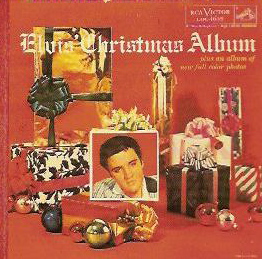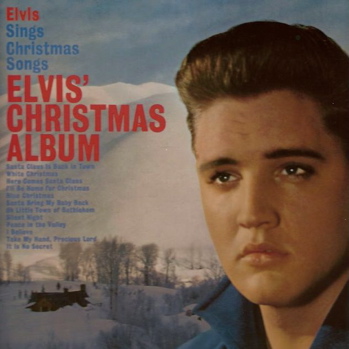Elvis' Christmas Album Drew Harsh Criticism in 1957
Elvis fans, of course, embraced "Elvis' Christmas Album," as they did every record he released in those days. However, to those adults who were already convinced that Elvis threatened the morals of the nation's youth, an album of Christmas songs from him was especially troublesome. For Elvis to sing rock 'n' roll was bad enough, but for him to step outside that category and into the traditional, religious field of Christmas music was frightening to many. Before looking at how critics reacted to "Elvis' Christmas Album" in 1957, let's take a quick look at the LP's content. Four of the album's 12 cuts were recycled recordings of non-Christmas religious hymns that Elvis had recorded in January 1957 and released on an extended play album in April of that year. They were "Peace in the Valley," "I Believe," "Take My Hand, Precious Lord," and "It Is No Secret (What God Can Do)." Elvis used traditional arrangements on all four songs, and so, beyond the quality of his voice, critics found little to disparage in those recordings when they were included in Presley's holiday album.
Before looking at how critics reacted to "Elvis' Christmas Album" in 1957, let's take a quick look at the LP's content. Four of the album's 12 cuts were recycled recordings of non-Christmas religious hymns that Elvis had recorded in January 1957 and released on an extended play album in April of that year. They were "Peace in the Valley," "I Believe," "Take My Hand, Precious Lord," and "It Is No Secret (What God Can Do)." Elvis used traditional arrangements on all four songs, and so, beyond the quality of his voice, critics found little to disparage in those recordings when they were included in Presley's holiday album. What incensed critics was Elvis's treatment of the eight Christmas songs he recorded in Hollywood from September 5-7, 1957.
What emerged were eight varied recordings. It's difficult to understand how anyone could have gotten upset over Elvis's versions of the carols "Silent Night" and "O Little Town of Bethlehem." He sang both in traditional style, but his temerity in even recording them at all angered his critics. Two other recordings, "I'll Be Home for Christmas" and "Here Comes Santa Claus," had a bit of a rhythm and blues edge, but not much. The other four tunes received Elvis's "sexy, rock-it-up approach," in the words of Elvis historian Ernst Jorgensen. They were "Blue Christmas," "Santa Claus Is Back in Town," "Santa Bring My Baby Back (To Me)," and "White Christmas."
Elvis first spoke publicly of his Christmas album during a press conference in San Francisco on October 26, 1957. In what a San Francisco Chronicle reporter called "chilling" news, Elvis announced his Christmas album would be released soon. "It'll be a rock 'n' roll Christmas," he told the assembled press, adding that "Silent Night" was the only song he hadn't "monkeyed" with.
A few examples will suffice to demonstrate how this news was received within the music industry. Time magazine reported that bandleader Sammy Kaye said Elvis's album "borders on the sacrilegious. Presley has gone too far this time." Then, the Ohio Penitentiary News, representing a captive radio audience, condemned Elvis's treatment of "White Christmas," which the paper called "a song beloved until this creature recorded his barnyard version of it."
Elvis's treatment of "White Christmas" drew the most criticism
Elvis's version of "White Christmas" closely followed an earlier recording of the song by The Drifters. Irving Berlin was said to have been so upset by this arrangement of his song that he tried to have it banned from being played on radio stations.
Some stations went along with his request. One was KEX in Portland, Oregon. On December 10, 1957, the station's all-night disk jockey, Al Priddy, was fired for intentionally playing Elvis's recording of "White Christmas" on the air in violation of station policy. Variety reported that station program manager Mel Bailey "had forbidden all KEX jockeys to play the RCA Victor platter because he felt that this treatment of the song is in 'extremely bad taste.'"
It was from radio stations north of the border, however, that "Elvis' Christmas Album" received the most criticism and banishment from the airwaves. This was despite Presley having played to huge crowds earlier in the year during concerts in Toronto, Ottawa, and Vancouver. In the latter city, all six of the town's radio stations agreed to a proposed ban on Elvis's holiday recordings.
 Radio station CKXL in Calgary also banned Elvis's album. "Presley's latest release has, we feel, no place on our station," said a CKXL spokesman. "We have the album for audition—it speaks for itself. Presley sings the Christmas songs exactly as we expected he would. It is one of the most degrading things we have heard in some time." He described Presley as "panting" through the hymns "Silent Night" and "O Little Town of Bethlehem." Another Calgary station, CFCN, denied an official ban, but stated Elvis's album "would not be played because it happens to be in lousy taste."
Radio station CKXL in Calgary also banned Elvis's album. "Presley's latest release has, we feel, no place on our station," said a CKXL spokesman. "We have the album for audition—it speaks for itself. Presley sings the Christmas songs exactly as we expected he would. It is one of the most degrading things we have heard in some time." He described Presley as "panting" through the hymns "Silent Night" and "O Little Town of Bethlehem." Another Calgary station, CFCN, denied an official ban, but stated Elvis's album "would not be played because it happens to be in lousy taste." In Toronto, station CFRB banned the album, declaring, "there are better interpretations of Xmas hymns." Gordon Sinclair, columnist for the Toronto Star, condemned Presley's rock 'n' roll treatment of Christmas carols. "Only Mahalia Jackson could jazz the hymns," he said. Sinclair added that he disliked censorship, but found Elvis's treatment of Christmas songs to be "wildly inappropriate."
The nationwide Canadian Broadcasting Corporation, however, took a progressive stand on "Elvis' Christmas Album." A spokesman stated, "We have no objection if listeners want to hear the Presley albums and CBC disk jockeys want to play the numbers."
Of course, back in the U.S. "Elvis' Christmas Album" racked up big sales. On October 7, Billboard reported that advance orders for the LP far exceeded RCA's planned production of 200,000 copies. An RCA exec called it, "the greatest advance album order in the history of the company."
"Elvis' Christmas Album" eventually reached gold record status
"Elvis' Christmas Album" reached #1 on Billboard's album chart during the 1957 holiday season. Elvis's version of "Blue Christmas," now considered a rock 'n' roll holiday classic, is played on radio stations across the country every December.
Of course, "Elvis' Christmas Album" was reissued every holiday season after its first appearance in 1957. During the Yule season of 1963, sales of the album finally reached the $1 million mark, earning it gold record status. It was Elvis's sixth gold album at the time. In the 45 years since then, Elvis's first Christmas LP has continued to sell in a multitude of repackaged recording products. The popularity of Elvis's first Christmas recordings has outlived most of those critics who condemned them over 50 years ago.
No hay comentarios:
Publicar un comentario